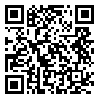BibTeX | RIS | EndNote | Medlars | ProCite | Reference Manager | RefWorks
Send citation to:
URL: http://jdisabilstud.org/article-1-1771-en.html
2- Faculty Member of Islamic Azad University, Garmsar Branch
Background & Objectives: Academic anxiety is a type of situational or specific anxiety that occurs in a social context due to educational conditions. This anxiety, which is the most important type of anxiety in adolescence, has an adverse effect on students' mental health, the efficiency and flourishing of their talents, personality development, academic motivation, and social identity. Academic involvement involves different dimensions: behavioral involvement requires student participation in learning activities such as persistence and attention; cognitive involvement involves active self–regulation and complex learning strategies. It is more and more about motivational concepts of learning. Academic burnout can be significantly affected by defective cognitive and metacognitive strategies. Cognitive and behavioral techniques can be effective in reducing it. Given this, as well as the relationship between these variables and academic anxiety, it seems that cognitive–behavioral training can be effective in this regard. However, not much attention has been paid to such interventions. The purpose of this study was to investigate the effectiveness of self–monitoring model training in improving academic burnout and engagement in students with academic anxiety.
Methods: The method of this research was quasi–experimental with a pretest–posttest design with a control group. The statistical population consisted of all female high school students with academic anxiety in Tehran city, Iran who were studying in the junior high schools in the academic year of 2019–2020. After obtaining the necessary permits, announcements about participating in the research were distributed in the Martyrs' School (District 18) in Tehran. Then, for the volunteers participating in the research, the Test Anxiety Scale (Sarason, 1977) was performed. Among the volunteers, individuals whose anxiety scores were above average were selected as a sample and randomly assigned to the control and experimental groups (each group with 12 people). Other tools for collecting data were Maslach Burnout Inventory–Revised (Schaufeli et al., 2002) and Academic Engagement Questionnaire (Zerang, 2012). After grouping, the experimental group participated in 10 training sessions and the control group did not receive any intervention. The collected data were analyzed in the pretest and posttest using descriptive statistics (mean and standard deviation) and inferential statistics (multivariate analysis of covariance) in SPSS software version 25. Also, the level of significance considered in the present study was 0.05.
Results: The results showed that after adjusting the effect of pretest scores, in the posttest, there was a significant difference between the experimental and control groups in the variables of academic fatigue (p<0.001), academic inefficiency (p<0.001) and academic engagement (p<0.001); but no significant difference was observed in academic apathy (p=0.094).
Conclusion: The study results emphasized the self–monitoring model’s relative efficiency on improving burnout, anxiety, and academic engagement of students with academic anxiety. Applying this training model improves the variables of academic fatigue, academic inefficiency, and academic engagement.
| Rights and permissions | |
 |
This work is licensed under a Creative Commons Attribution-NonCommercial 4.0 International License. |





